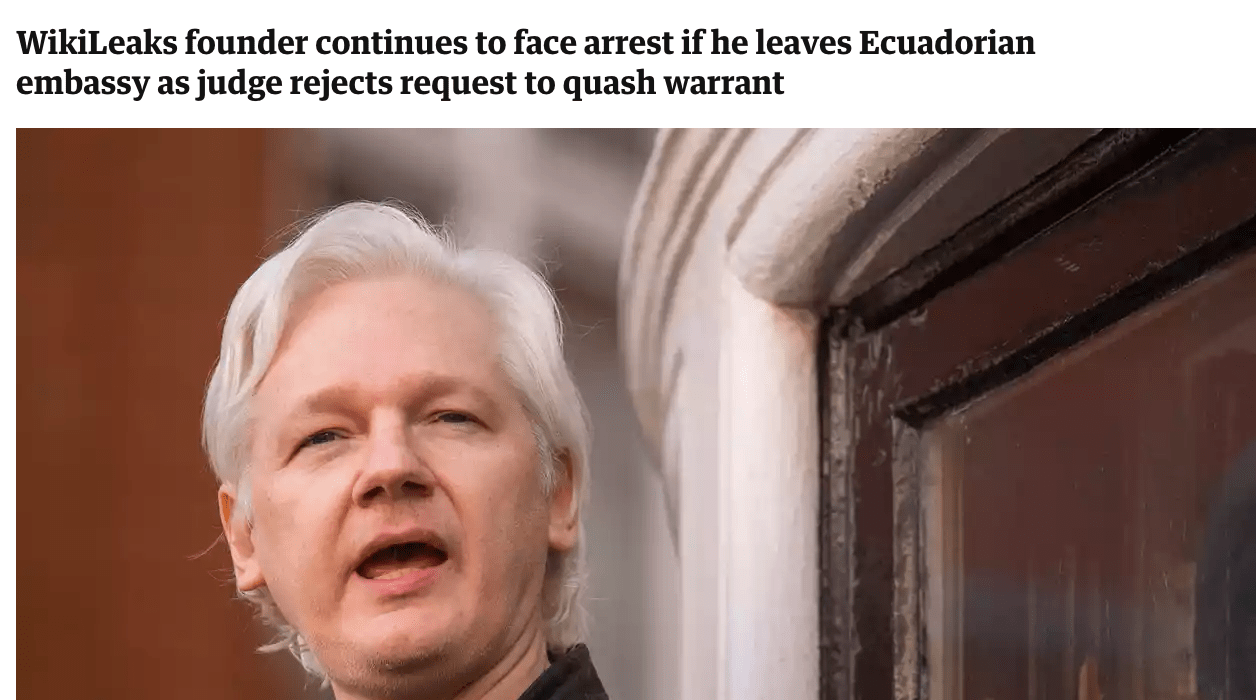“I find arrest is a proportionate response.” That was the judgement delivered in court last Tuesday by Judge Emma Arbuthnot, presiding over the case brought to court by Julian Assange’s lawyers. Their argument had been that the warrant for his arrest ought to be withdrawn because arresting him (after the extradition request from Sweden had been rescinded) “was no longer proportionate or in the public interest“. The elephant in the room is, of course, the fact that the whole affair was always about the thinly veiled US plan to apprehend Julian, throw him into the type of unfathomable cell in which Chelsea Manning was incarcerated for 18 months, and deny him any opportunity to defend himself from ludicrous
Topics:
Yanis Varoufakis considers the following as important: Campaigning, English
This could be interesting, too:
Yanis Varoufakis writes Jamie Galbraith on DiEM-TV’s ‘Another Now’ discussing the “criminal incapacity of the elites”
Yanis Varoufakis writes A chronicle of our BLEAK TWENTIES – Cambridge Union Online
Yanis Varoufakis writes European Oligarchy Has Banned Transfer of Wealth to Poor: Interviewed by Vijay Prashad
Yanis Varoufakis writes Have Merkel & Macron just announced a eurobond-funded godsend for the EU? DiEM25’s view

“I find arrest is a proportionate response.” That was the judgement delivered in court last Tuesday by Judge Emma Arbuthnot, presiding over the case brought to court by Julian Assange’s lawyers. Their argument had been that the warrant for his arrest ought to be withdrawn because arresting him (after the extradition request from Sweden had been rescinded) “was no longer proportionate or in the public interest“.
The elephant in the room is, of course, the fact that the whole affair was always about the thinly veiled US plan to apprehend Julian, throw him into the type of unfathomable cell in which Chelsea Manning was incarcerated for 18 months, and deny him any opportunity to defend himself from ludicrous spying charges. Given that both sides of US politics have confirmed that this is indeed their intention (a rare occasion when Donald Trump and Hillary Clinton have agreed), it was quite interesting to read Judge Arbuthnot’s response:
“I accept that Mr Assange had expressed fears of being returned to the United States from a very early stage in the Swedish extradition proceedings but, absent any evidence from Mr Assange on oath, I do not find that Mr Assange’s fears were reasonable.”
As remarkably circular statements come, this is truly extraordinary: Judge Arbuthnot is dismissing as unreasonable Julian’s fears that if he were to exit the Ecuadorian Embassy in London to be arrested by police he would be extradited to the US before being thrown into the US supermax, Guantanamo-like, system. And why did she dismiss his fears? Because Julian did not step out of the Ecuadorian Embassy and into her court to express them!
Now, of course, I am no lawyer and most certainly have no expertise, or right, to pass judgement on the good judge – except to state my puzzlement at the logicality – or otherwise – of her verdict. However, there is a serious matter on which all of us, who were observing with interest this case, have a duty to bring to the fore. It is a matter that concerns a potentially mind boggling conflict of interest afflicting Judge Arbuthnot.
If my sources are correct (and I do stress this if), Judge Arbuthnot is the wife of Lord Arbuthnot, former minister of defence, until recently former chairman of the defence committee, director of an outfit known as SC Strategy (owned by the former head of MI6 and co-directed by another head of MI6) and, last but not least, on the advisory board of Thales – one of the largest arms manufacturers and dealers and, crucially, a company associated with corrupt deals whose role has often been exposed by WikiLeaks.
